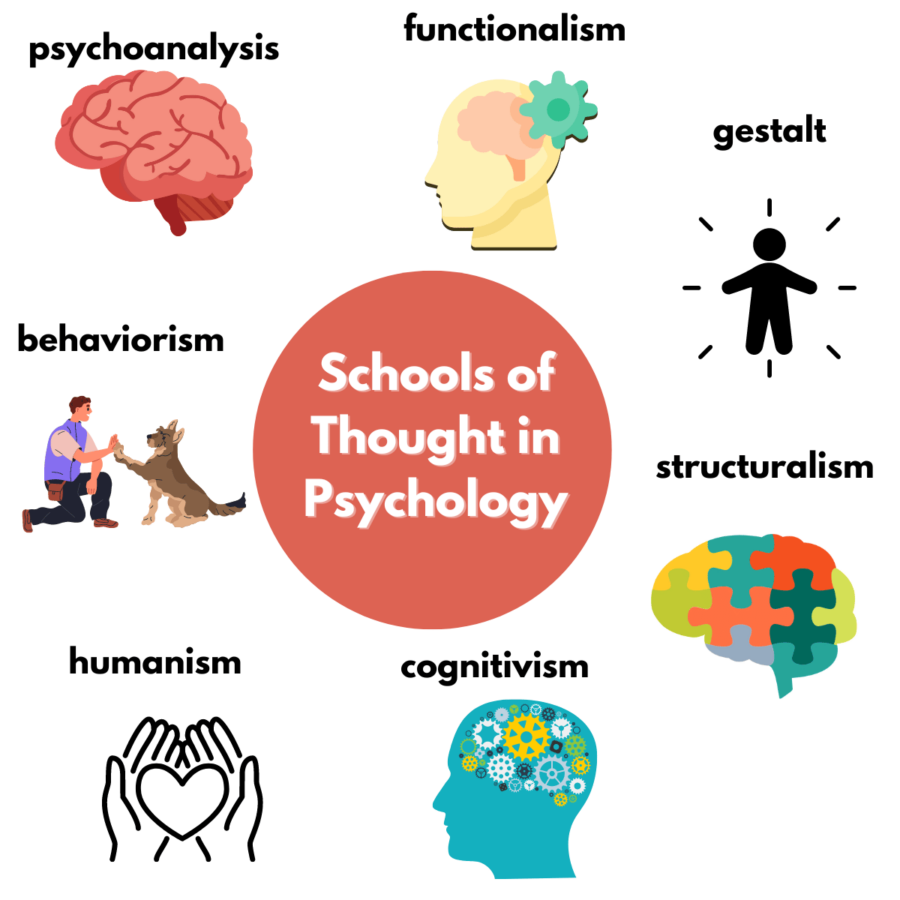7 Main Schools of Thought in Psychology
From behaviorism to humanism, the seven schools of thought in psychology offer unique insights into the mind. Explore how each perspective has shaped our understanding of human behavior and mental processes.

Schools of thought in psychology represent distinct frameworks or perspectives through which psychologists understand human behavior and mental processes. These schools, such as behaviorism, psychoanalysis, cognitive psychology, and humanistic psychology, offer unique theories, methods, and principles to interpret and address psychological phenomena.
Learning more about psychology’s different schools of thought can help you better understand the range and complexity of human nature. Exploring the various schools of thought also offers insights into psychology’s theoretical foundations and practical applications.

The 7 Main Schools of Thought in Psychology
Seven of the main schools of thought in psychology are::
- Structuralism: Focuses on breaking down mental processes into their basic components to understand the structure of the mind. It relies on introspection to analyze sensations, feelings, and perceptions.
- Functionalism: Emphasizes the adaptive functions of behavior and mental processes in helping individuals survive and thrive in their environments. It explores how the mind works to fulfill its purpose in everyday life.
- Gestalt psychology: Views the mind as organized wholes rather than a sum of individual parts. It examines how the organization of sensory elements and the principles of figure-ground, similarity, and closure shape perceptions.
- Psychoanalysis: Developed by Sigmund Freud, psychoanalysis explores the unconscious mind and how childhood experiences affect behavior. It emphasizes the role of unconscious conflicts and desires in shaping personality and behavior.
- Behaviorism: Focuses on observable, overt behaviors and the environmental factors that influence them. It emphasizes learning through conditioning and reinforcement, largely ignoring internal mental processes.
- Humanism: Emphasizes the inherent goodness and potential for growth in individuals. It focuses on personal experiences, self-actualization, and the importance of subjective perception in understanding behavior.
- Cognitivism: Focuses on mental processes such as thinking, memory, perception, and problem-solving. It examines how individuals process information, make decisions, and interact with the world around them.
These schools of thought represent different historical and theoretical perspectives in psychology, each offering unique insights into the study of human behavior and mental processes.
The Structuralist School of Thought in Psychology
The structuralist school of thought was the first school of thought in psychology, founded by Wilhelm Wundt in the late 19th century. It aimed to analyze the structure of the human mind by breaking down mental processes into their fundamental components.
Wundt and his followers utilized introspection, a method of self-observation and reflection, to examine sensations, feelings, and perceptions. They believed that by systematically studying these elements, they could uncover the underlying structure of consciousness.
Structuralists focused on understanding the basic building blocks of mental experiences, such as sensations and thoughts, and how they combined to form more complex psychological phenomena.
While structuralism significantly impacted the development of psychology as a scientific discipline, it eventually gave way to other schools of thought, such as functionalism and behaviorism, which criticized its reliance on subjective introspection and lack of emphasis on observable behavior.
Nonetheless, structuralism laid the groundwork for the systematic study of mental processes and paved the way for future psychological research methods and theories.
The Functionalist School of Thought in Psychology
William James introduced the functionalist school of psychology, which shifted the focus from simply analyzing the structure of the mind, as seen in structuralism, to exploring why mental processes and behaviors exist and how they aid individuals in adapting to their environment.
Rather than breaking down consciousness into individual elements, functionalists emphasized the continuous flow of experiences. They sought to understand how various mental processes served practical purposes in everyday life. This approach led them to investigate topics such as attention, memory, emotion, and problem-solving, aiming to uncover the adaptive functions of these processes.
While behaviorism eventually became more prominent than functionalism in popularity, its emphasis on the practical aspects of psychology and the functionality of mental processes left a lasting impact on the field.
Today, concepts from functionalism continue to influence research in areas such as cognitive psychology and evolutionary psychology, underscoring its enduring relevance in understanding human behavior and cognition.
The Gestalt School of Thought in Psychology
The Gestalt school of thought in psychology focuses on how people perceive and experience the world around them as organized wholes rather than just a collection of individual parts. The word “Gestalt” comes from German and roughly translates to “whole” or “pattern.”
Gestalt psychologists believe that our perceptions are more than just the sum of their parts and that our minds naturally organize sensory information into meaningful patterns and structures.
One of the key principles of Gestalt psychology is the idea of “figure-ground perception.” This principle suggests that we naturally perceive objects as distinct from their background. For example, when we look at a picture, we can easily distinguish the main objects (the figures) from the background (the ground).
Gestalt psychologists also studied other principles of perception, such as proximity, similarity, closure, and continuity, which describe how we group elements together to form meaningful perceptions.
The Psychoanalytic School of Thought in Psychology
The psychoanalytic school of thought in psychology was founded by Sigmund Freud, who believed that unconscious thoughts and desires greatly influence human behavior. According to psychoanalytic theory, our minds are divided into three parts: the conscious, the preconscious, and the unconscious. Freud suggested that much of our behavior is driven by unconscious urges and desires of which we may not be aware.
One of the central concepts in the psychodynamic model of mind is the idea of the id, ego, and superego. The id represents the primal, unconscious part of the psyche. The superego is the moralistic part of the mind that strives for perfection. Finally, Freud believed the ego mediated between the demands of the id, the superego, and the real world.
Freud also proposed that personality is formed through a series of psychosexual stages. Each stage is characterized by a different focus on pleasure and conflict. The resolution of these conflicts during childhood shapes adult personality.
For example, the oral stage, which occurs during infancy, is focused on pleasure from sucking and chewing, and conflicts during this stage might lead to issues with dependency or aggression later in life.
Psychoanalysis, the therapeutic approach developed by Freud, aims to bring unconscious conflicts and desires into conscious awareness through techniques such as free association and dream analysis.
While Freud’s ideas have been highly influential in psychology, they have also been subject to criticism and debate, particularly regarding their emphasis on sexual and aggressive instincts and the lack of empirical evidence to support some of his claims.
The Behaviorist School of Thought in Psychology
Behaviorism is a school of psychology that focuses on observable behaviors rather than inner thoughts and feelings. It suggests that behaviors can be studied scientifically, just like other natural phenomena.
Behaviorists believe that our actions are influenced by our environment and experiences rather than internal thoughts or unconscious desires.
One of the key figures in behaviorism was Ivan Pavlov, who famously conducted experiments with dogs. He discovered that dogs could be trained to associate a neutral stimulus, like the ringing of a bell, with food. Eventually, the dogs would salivate at the sound of the bell alone, even when no food was present. This process, known as classical conditioning, demonstrated how behaviors could be learned through associations.
Another important behaviorist was B.F. Skinner, who introduced the concept of operant conditioning. Skinner believed that behaviors could be shaped through reinforcement or punishment.
For example, if a behavior is followed by a reward, such as praise or a treat, it’s more likely to be repeated in the future. On the other hand, if a behavior is followed by a negative consequence, like criticism or a timeout, it’s less likely to occur again. Skinner’s work emphasized the role of consequences in shaping behavior, highlighting the importance of the environment in determining how we act.
The behaviorist school of thought has had a significant impact on psychology by providing insights into how behaviors are learned and influenced.
The Humanistic School of Thought in Psychology
The humanistic school of thought in psychology focuses on understanding and promoting human growth, potential, and self-fulfillment. Unlike other schools of thought that emphasize behavior, cognition, or unconscious processes, humanistic psychology focuses on human experiences, feelings, and the individual’s unique perspective.
One of the key concepts in humanistic psychology is self-actualization, a term coined by psychologist Abraham Maslow. Self-actualization refers to the process of realizing one’s full potential and becoming the best version of oneself.
Humanistic psychologists believe all individuals have an innate drive towards self-actualization and personal growth.
Another important aspect of humanistic psychology is the idea of the self and self-concept. Humanistic psychologists emphasize the importance of self-awareness and self-understanding in shaping behavior and experiences. They believe that individuals strive to maintain a positive self-image and to align their actions with their core values and beliefs.
Humanistic psychology also emphasizes the importance of personal agency and responsibility. Unlike other schools of thought that might emphasize external factors or unconscious drives, humanistic psychology strongly emphasizes the individual’s capacity to make choices and take control of their own lives. This perspective highlights the importance of personal autonomy and empowerment in achieving personal growth and fulfillment.
Humanistic psychology has significantly impacted various areas of psychology, including therapy, education, and personal development. Humanistic approaches, such as Carl Rogers’s client-centered therapy, emphasize empathy, genuineness, and unconditional positive regard as essential components of the therapeutic process.
The Cognitive School of Thought in Psychology
The cognitive school of thought in psychology focuses on how people think, perceive, remember, and solve problems. Unlike behaviorism, which emphasizes observable behaviors, cognitive psychology explores internal mental processes, such as attention, memory, language, and problem-solving. Cognitive psychologists believe that understanding these processes is crucial for understanding human behavior.
One of the key ideas in cognitive psychology is the concept of information processing. This perspective views the mind as a complex information-processing system like a computer. According to this view, we take in information from our environment, process it, and then produce a response.
Cognitive psychologists study how we encode, store, and retrieve information, as well as how we make decisions and solve problems.
Another important aspect of cognitive psychology is the study of schemas and mental representations. Schemas are mental frameworks that help us organize and interpret information.
For example, we might have a schema for a “dog” that includes characteristics such as four legs, fur, and barking. These schemas influence how we perceive and remember information, as well as how we make judgments and decisions.
Cognitive psychology also emphasizes the role of cognition in behavior. For example, researchers have studied how people use mental shortcuts, or heuristics, to make decisions quickly and how cognitive biases and errors in thinking can lead to irrational behavior. The cognitive school of thought in psychology has profoundly impacted our understanding of human thought and behavior, influencing fields such as education, therapy, and artificial intelligence.
Sources:
Airenti G. (2019). The place of development in the history of psychology and cognitive science. Frontiers in Psychology, 10, 895. https://doi.org/10.3389/fpsyg.2019.00895
Hamachek, D.E. (1987). Humanistic psychology. In: Glover, J.A., Ronning, R.R. (eds) Historical Foundations of Educational Psychology. Perspectives on Individual Differences. Springer, Boston, MA. https://doi.org/10.1007/978-1-4899-3620-2_9
Murray, D.J. (2012). Gestalt psychology. In: Rieber, R.W. (eds) Encyclopedia of the History of Psychological Theories. Springer, New York, NY. https://doi.org/10.1007/978-1-4419-0463-8_2
Tarzian, M., Ndrio, M., & Fakoya, A. O. (2023). An introduction and brief overview of psychoanalysis. Cureus, 15(9), e45171. https://doi.org/10.7759/cureus.45171





